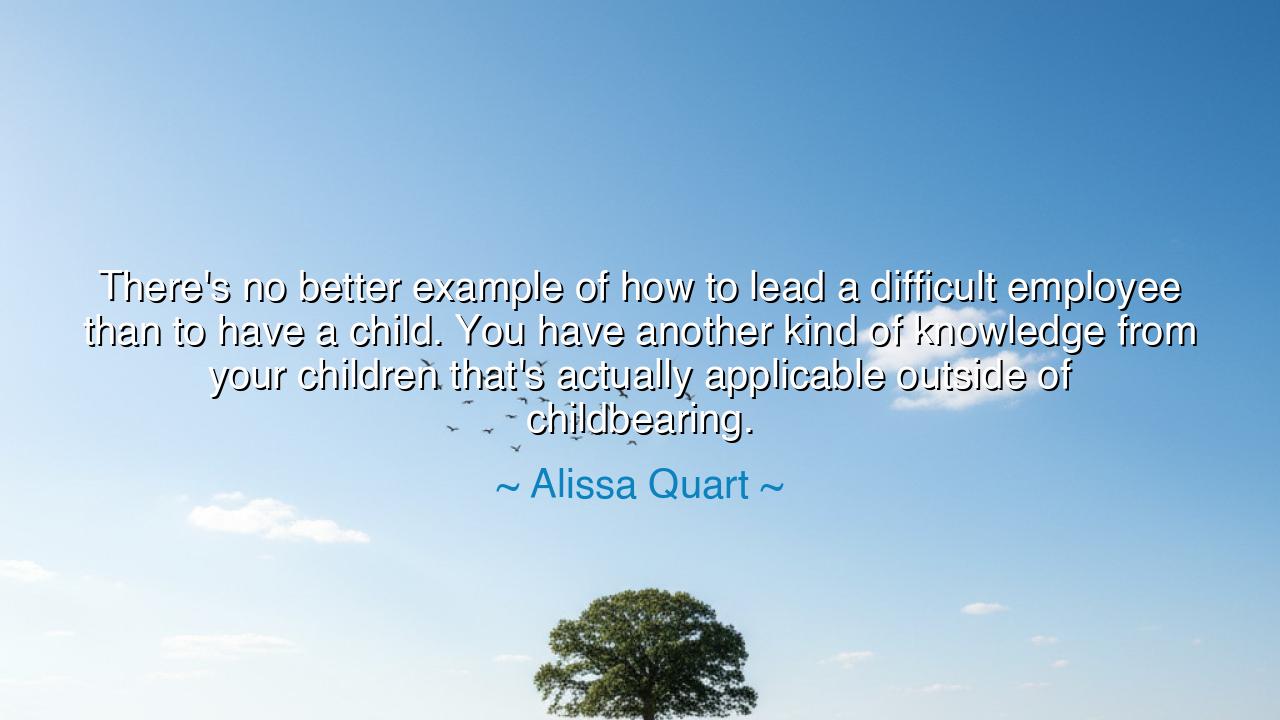
There's no better example of how to lead a difficult employee
There's no better example of how to lead a difficult employee than to have a child. You have another kind of knowledge from your children that's actually applicable outside of childbearing.






The quote by Alissa Quart — “There's no better example of how to lead a difficult employee than to have a child. You have another kind of knowledge from your children that's actually applicable outside of childbearing” — reveals a profound truth that stretches across generations, cultures, and the timeless rhythm of human life. It speaks to the eternal connection between leadership and parenthood, between the art of guiding others and the art of nurturing growth. In the wisdom of the ancients, every form of authority was seen not as domination, but as stewardship — the delicate balance between firmness and compassion, discipline and understanding. Quart’s words remind us that the first and greatest lesson in leadership begins not in the marketplace or the battlefield, but in the humble act of raising a child.
To lead a difficult employee, one must possess patience, empathy, and a deep understanding of human nature — virtues that are refined most purely in parenting. A child, in their innocence and defiance, mirrors every emotion of humanity. They teach us how to listen without judgment, how to correct without cruelty, and how to nurture independence while maintaining order. In ancient households, the father or mother who guided their children with wisdom was revered as a philosopher of the hearth — one who ruled not with commands, but with love and foresight. Quart’s insight reveals that the emotional intelligence learned through child-rearing is not bound to the home; it flows outward into every sphere of human interaction.
Consider the story of Marcus Aurelius, the Roman Emperor and Stoic philosopher. He ruled an empire fraught with betrayal, war, and turmoil — yet his writings in Meditations often reflect the tenderness of a father teaching his sons. Through his reflections, he reveals that true leadership begins with understanding human frailty, just as a parent understands the missteps of a child. He led not through fear but through example, much as a patient parent leads a stubborn child toward virtue. His ability to see beyond anger into the heart of human weakness was a power born not from conquest, but from compassion — a lesson that aligns perfectly with Quart’s vision of leadership rooted in parental wisdom.
The knowledge gained from children is not academic; it is intuitive, emotional, and transformative. When a child tests boundaries, they mirror the challenges faced by any leader dealing with difficult subordinates. They teach humility — for a parent quickly learns that control is an illusion, and that guidance must replace domination. They teach creativity — for each day demands new ways of understanding and motivating. They teach endurance — for patience is the bridge between chaos and growth. This “other kind of knowledge” is ancient and sacred: the knowledge of human connection. It cannot be taught in schools, but it can be lived and felt through every sleepless night, every moment of reconciliation, every word spoken in love instead of anger.
In the tale of Confucius, we see this mirrored wisdom. The great teacher once said that to govern a nation, one must first learn to govern a family. For the home is the first kingdom, and the child is both disciple and reflection. Through his teachings, Confucius revealed that moral order in society begins with the tenderness and discipline of family life. Quart’s quote is a modern echo of this ancient truth — that the lessons of care, patience, and moral example learned within the home are the same virtues that sustain all good leadership.
Leadership, at its core, is a sacred relationship between souls. To lead well, one must understand fear, pride, and longing — emotions children express without disguise. To guide a child is to hold a mirror to one’s own heart. To guide an employee or a team is to face the same mirror, only in a different light. The parent who has learned to forgive, to teach, to set boundaries with grace, carries within them a silent mastery that transcends all professional training.
The lesson, then, is clear: to lead is to love wisely. The leader who approaches others with the patience of a parent will command loyalty not through authority, but through trust. The one who listens as a parent listens to a child’s fears will create unity instead of division. The one who disciplines with purpose, not wrath, will see transformation rather than rebellion. Quart reminds us that the greatest schools of leadership are not universities or corporations, but the living classrooms of our own families.
Therefore, let those who aspire to lead remember this: nurture before you command, listen before you judge, guide before you punish. Let your leadership be like that of a wise parent — gentle, enduring, and rooted in the faith that all beings, no matter how difficult, are capable of growth. For in leading others with the heart of a parent, you embody the highest form of wisdom — the knowledge of humanity itself.






AAdministratorAdministrator
Welcome, honored guests. Please leave a comment, we will respond soon